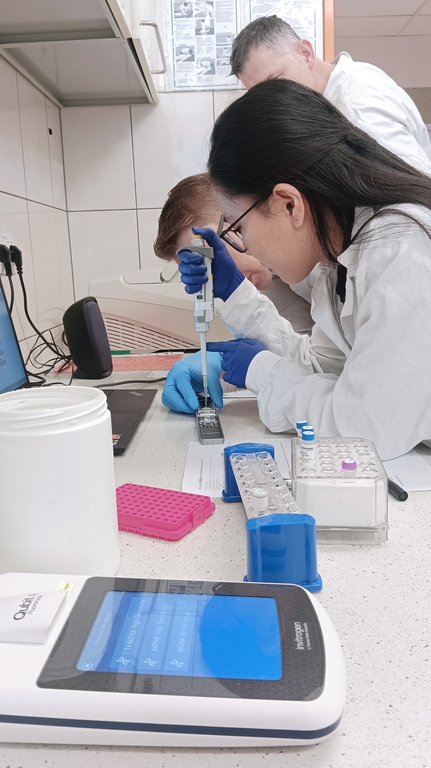BRIGHT - Biodiversity Research Integrating Barcoding, Genomics and High-throughput Technologies
Biodiversity Genomics Europe (BGE) Joint Network Training Workshop
Dates: 3-7 February 2025
Targeted audience: Polish students, young researchers, citizen scientists, stakeholders.
Knowledge requirement: Basic knowledge of biology, especially knowledge and interest in biodiversity, nucleic acids composition and function.
Costs: the course is free of charge (including coffee breaks); travel, accommodation and lunches are not covered
Language: English
Contact: polbol@biol.uni.lodz.pl
Online meetings assistance: Łukasz Trębicki (lukasz.trebicki@biol.uni.lodz.pl)
Form of participation:
1. Practical + theoretical, in person (up to 20 participants)
2. Theoretical only, online (up to 40 participants)
20 places are secured for in person participation in the course. The choice will be made based on your answers in the registration form. The priority will be given to students, early carrier researchers, stake holders, citizen scientists.
Address: Banacha 12/16, 90-237 Łódź. Faculty of Biology and Environmental Protection, Department of Invertebrate Zoology and Hydrobiology, University of Lodz
Organizers: PolBOL UniLodz (polbol.uni.lodz.pl) and Biodiversity Genomics Europe consortium (biodiversitygenomics.eu)
Registration deadline: 18 December 2024.
Results of evaluation: 20 December 2024.
Thanks to the synergy of DNA barcoding, genomics methods and high-throughput sequencing technologies, recognition of biodiversity from individuals through populations to species levels became available for everyone. The workshop will provide practical training and theoretical knowledge on using modern molecular tools in a wide aspect of biodiversity studies.
Workshop covers (theoretical and practical):
-
Material sampling and storage
-
DNA isolation (barcoding and genomics)
-
DNA barcoding (amplification, quality control, sequencing with Oxford Nanopore Techniques)
-
Sequencing technologies and their applications
-
Genomic data applications and databases (reference genomes, conservation genomics)
-
Data analysis and management (databases: BOLD, ENA; bioinformatic pipelines)
-
Citizen Science
Material for the course:
During the course we will focus on model invertebrate group - pollinators collected from Impatiens spp. from different sampling sites in Poland.
Genome: Gammarus sp. collected around the city of Lodz.
BGE training general schedule:
Monday, 3 Feb 2025
|
|
|
|
|
|
|
|
|
|
|
|
|
|
|
|
|
|
|
|
|
|
|
|
|
|
|
Tuesday, 4 Feb 2025
|
|
|
|
|
|
|
|
|
|
|
|
|
|
|
|
|
|
|
|
|
|
|
|
|
|
|
Wednesday, 5 Feb 2025
|
|
|
|
|
|
|
|
|
|
|
|
|
|
|
Thursday, 6 Feb 2025
|
|
|
|
|
|
|
|
|
|
|
|
|
|
|
|
|
|
|
|
|
|
|
|
|
|
|
Friday, 7 Feb 2025
|
|
|
|
|
|
|
|
|
|
|
|
|
|
|
|
|
|
|
|
|
|
|
|
Lectures
Practical classes in wet laboratory
Practical classes outside or using computers
Instructors:
Theory:
Karolina Bącela-Spychalska (KBS), University of Lodz, Poland
Thomas Brown (TB), Leibniz Institute of Zoo and Wildlife Research, Germany
Andrea Desiderato (AD), University of Lodz, Poland
Michał Grabowski (MG), University of Lodz, Poland
Piotr Gadawski (PG), University of Lodz, Poland
Marcin Kamiński (MK), Museum & Institute of Zoology, Polish Academy of Sciences, Poland
Tomasz Mamos (TM), University of Lodz, Poland
(JP), European Molecular Biology Laboratory, Hinxton, UK
Lyndall Pereira da Conceicoa (LPC), Wellcome Sanger Institute, UK
Tomasz Rewicz (TR), University of Lodz, Poland
Igor Siedlecki (IS), University of Warsaw, Poland
Amrita Srivathsan (AS), National History Museum, Germany
Grzegorz Tończyk (GT), University of Lodz, Poland
Marta Sobalska-Kwapis (MSK), University of Lodz, BioBank, Poland
Laboratory:
Karolina Biniek (KB), University of Lodz
Wiktoria Cechowicz (WC), University of Lodz
Piotr Gadawski (PG), University of Lodz
Gabriela Karlik (GK), University of Lodz
Tomasz Mamos (TM), University of Lodz
Serena Mucciolo (SM), University of Lodz
Tomasz Rewicz (TR), University of Lodz
Computing:
Thomas Brown (TB), Leibniz Institute of Zoo and Wildlife Research, Germany
Andrea Desiderato (AD), University of Lodz
Tomasz Mamos (TM), University of Lodz
Amrita Srivathsan (AS), National History Museum, Berlin



